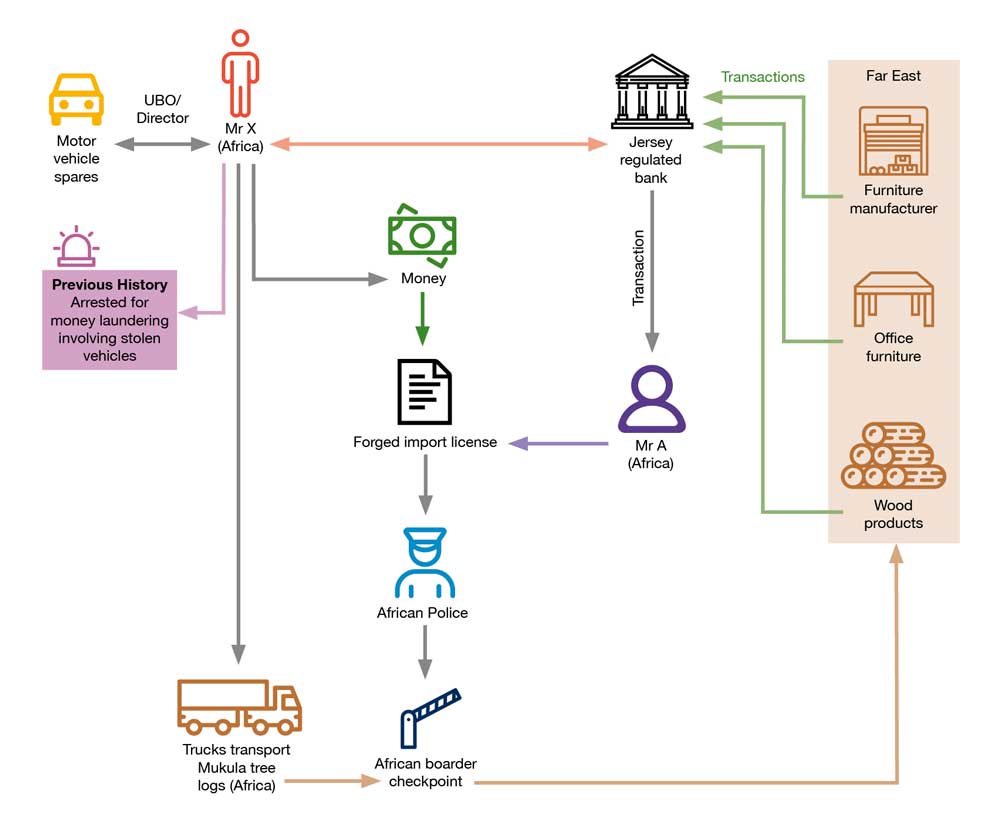A Jersey branch of an international bank has shared adverse information relating to their joint client, Mr X, who has been arrested in a Jersey Financial Services Commission (JFSC) D2 higher-risk African country for bribery, corruption and being linked to organised crime.
Mr X is a national of this high-risk African country, and his Jersey bank account was opened in 2015. Mr X is the Ultimate Beneficial Owner (UBO) and director of a motor vehicle spares and accessories company in the capital city, which was incorporated in 2010.
He states his Source of Wealth (SoW) comes from salary and real estate investment.
In January 2025, Mr X and his girlfriend were arrested at their home address for alleged Money Laundering (ML) involving stolen vehicles. Consequently, the bank has conducted open-source checks and found that the country’s Anti-Corruption Commission had previously arrested Mr X for offering local African currency valued at $10,000 to the Republic Border Police, and providing forged import licence documents to allow four trucks transporting Mukula tree logs to pass a checkpoint on the western border.
The Mukula tree1, also known as redwood, is a slow-growing type of rosewood found in Southern and Eastern Africa and is an endangered species. The Mukula tree is a valuable resource across a number of African countries and is subject to strict export controls. They are recorded as being illegally exported to countries such as the USA and China due to their broad utility, including the bark used for medicinal purposes and the wood used to produce gunstocks2.
The Mukula tree has the characteristics of rosewood trees and is being used by Chinese buyers as a false rosewood. Shipments have been recorded as being sent through African intermediary traders via Asian and South Asian countries, where they were further mixed with red Sandalwood and sold to Chinese furniture makers3. A United Nations Office on Drugs and Crime (UNODC) World Wildlife Crime Report from 2020, noted that the Mukula Tree was listed in the Convention on International Trade in Endangered Species of Fauna and Flora (CITES) Appendix II in 2019.
A review of the accounts has found extensive regular third-party credits from three companies in China with references to building material, goods and moveables, office fitments and a one-off debit to an individual called Mr A, resident in a Southern African country, also on the JFSC D2 list and FATF grey list.
The bank also found adverse media information on an individual with the same name as Mr A, who had been arrested by the local African Police Service for bribery and forging government documents.
There is very little information available on any of the companies. One website appeared very generic and, when translated, advertised its services regarding building materials, office products, and life products.
The bank review found no supporting documentation with a rationale for the credits. Discussions with the banking group’s Relationship Manager (RM) found that Mr X had previously confirmed that the credits represented a property transaction. However, the RM had difficulty obtaining documentary evidence for the transactions in the months leading up to Mr X’s arrest.

1 https://cites.org/sites/default/files/eng/com/PC/24/E-PC24-19-002.pdf
3 https://www.unodc.org/documents/data-and-analysis/wildlife/2020/World_Wildlife_Report_2020_9July.pdf
4 https://www.jerseyfsc.org/media/8129/appendix-d2-pdf.pdf
5 https://www.gov.je/Industry/Finance/pages/sustainablefinanceplan.aspx
6 https://unitedforwildlife.org/taskforces/financial-taskforce/
Environmental crime refers to a wide range of illegal activities that harm the environment or violate laws designed to protect environmental resources. This includes actions such as illegal dumping of hazardous waste, poaching of protected species, deforestation, pollution of air and water, and violation of wildlife protection laws. These activities not only threaten ecosystems and biodiversity but can also have serious health impacts on humans and contribute to climate change. Efforts to combat environmental crime involve stricter regulations, enforcement actions, and international cooperation to protect natural resources and promote sustainability.
We continually strive to enhance the quality of the products we produce, from our typologies to reports, Insight papers to training guides. However, we can only improve if you share your feedback with us about what you think about them. This is your chance to let us know and we appreciate it your feedback. Click the navy button below or scan the QR code.
Tell us what you think >.svg)